
LLM-on-Tabular-Data-Prediction-Table-Understanding-Data-Generation
Repository for collecting and categorizing papers outlined in our survey paper: "Large Language Models on Tabular Data -- A Survey".
Stars: 68
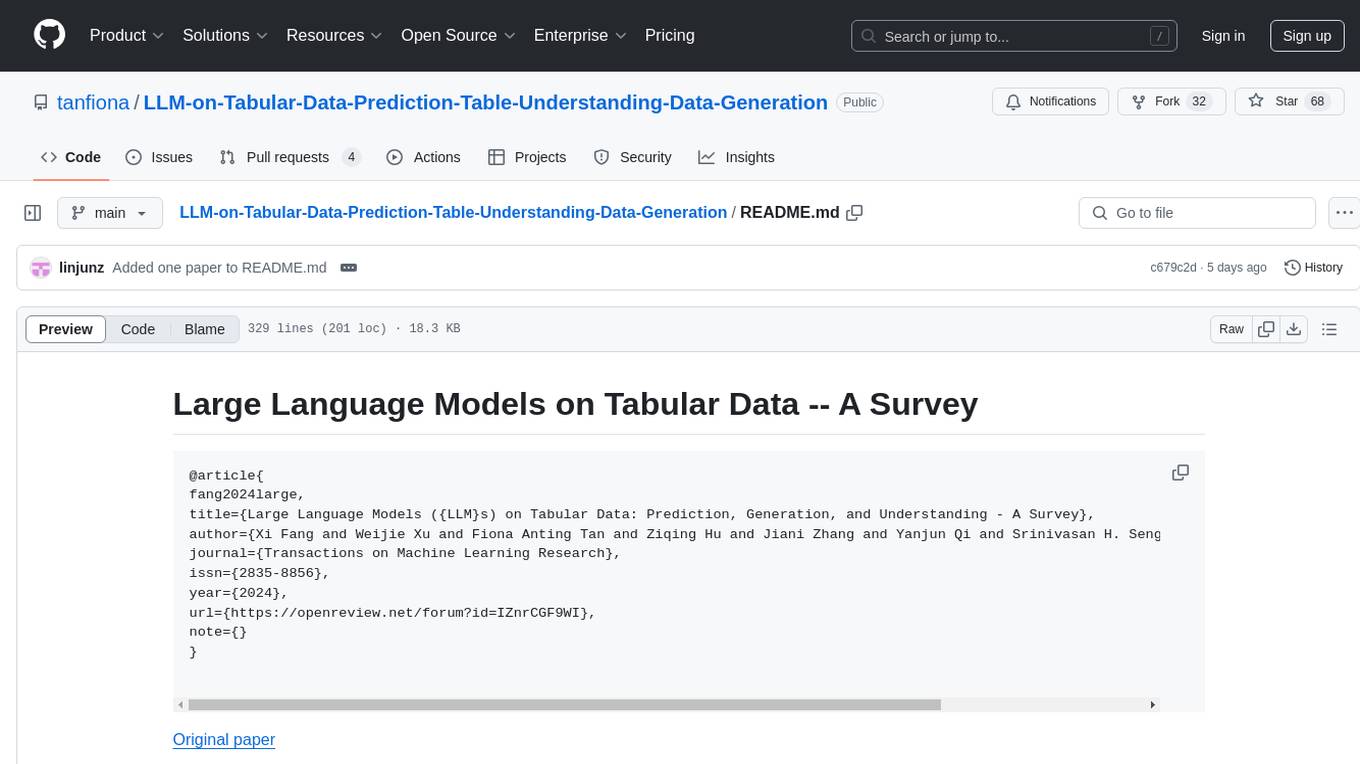
This repository serves as a comprehensive survey on the application of Large Language Models (LLMs) on tabular data, focusing on tasks such as prediction, data generation, and table understanding. It aims to consolidate recent progress in this field by summarizing key techniques, metrics, datasets, models, and optimization approaches. The survey identifies strengths, limitations, unexplored territories, and gaps in the existing literature, providing insights for future research directions. It also offers code and dataset references to empower readers with the necessary tools and knowledge to address challenges in this rapidly evolving domain.
README:
@article{
fang2024large,
title={Large Language Models ({LLM}s) on Tabular Data: Prediction, Generation, and Understanding - A Survey},
author={Xi Fang and Weijie Xu and Fiona Anting Tan and Ziqing Hu and Jiani Zhang and Yanjun Qi and Srinivasan H. Sengamedu and Christos Faloutsos},
journal={Transactions on Machine Learning Research},
issn={2835-8856},
year={2024},
url={https://openreview.net/forum?id=IZnrCGF9WI},
note={}
}
This repo is constructed for collecting and categorizing papers about diffusion models according to our survey paper——Large Language Models on Tabular Data -- A Survey. Considering the fast development of this field, we will continue to update both arxiv paper and this repo.
Abstract
Recent breakthroughs in large language modeling have facilitated rigorous exploration of their application in diverse tasks related to tabular data modeling, such as prediction, tabular data synthesis, question answering, and table understanding. Each task presents unique challenges and opportunities. However, there is currently a lack of comprehensive review that summarizes and compares the key techniques, metrics, datasets, models, and optimization approaches in this research domain. This survey aims to address this gap by consolidating recent progress in these areas, offering a thorough survey and taxonomy of the datasets, metrics, and methodologies utilized. It identifies strengths, limitations, unexplored territories, and gaps in the existing literature, while providing some insights for future research directions in this vital and rapidly evolving field. It also provides relevant code and datasets references. Through this comprehensive review, we hope to provide interested readers with pertinent references and insightful perspectives, empowering them with the necessary tools and knowledge to effectively navigate and address the prevailing challenges in the field.
Figure 1: Overview of LLM on Tabular Data: the paper discusses application of LLM for prediction, data
generation, and table understanding tasks.
Figure 4: Key techniques in using LLMs for tabular data. The dotted line indicates steps that are optional.
Table of content:
TABLET: Learning From Instructions For Tabular Data [code]
Language models are weak learners
LIFT: Language-Interfaced Fine-Tuning for Non-Language Machine Learning Tasks
[code]
TabLLM: Few-shot Classification of Tabular Data with Large Language Models
[code]
UniPredict: Large Language Models are Universal Tabular Classifiers
Towards Foundation Models for Learning on Tabular Data
Towards Better Serialization of Tabular Data for Few-shot Classification with Large Language Models
Multimodal clinical pseudo-notes for emergency department prediction tasks using multiple embedding model for ehr (meme) **[code]
StructLM: Towards Building Generalist Models for Structured Knowledge Grounding
UniTabE: A Universal Pretraining Protocol for Tabular Foundation Model in Data Science
Unleashing the Potential of Large Language Models for Predictive Tabular Tasks in Data Science [model]
Synthetic Oversampling: Theory and A Practical Approach Using LLMs to Address Data Imbalance
LLMs learn governing principles of dynamical systems, revealing an in-context neural scaling law
PromptCast: A New Prompt-based Learning Paradigm for Time Series Forecasting
Large Language Models Are Zero-Shot Time Series Forecasters
TEST: Text Prototype Aligned Embedding to Activate LLM's Ability for Time Series
Time-LLM: Time Series Forecasting by Reprogramming Large Language Models
[code]
MediTab: Scaling Medical Tabular Data Predictors via Data Consolidation, Enrichment, and Refinement
[code]
CPLLM: Clinical Prediction with Large Language Models
[code]
CTRL: Connect Collaborative and Language Model for CTR Prediction
FinGPT: Open-Source Financial Large Language Models
[code]
Language Models are Realistic Tabular Data Generators [code]
REaLTabFormer: Generating Realistic Relational and Tabular Data using Transformers
Generative Table Pre-training Empowers Models for Tabular Prediction [code]
TabuLa: Harnessing Language Models for Tabular Data Synthesis [code]
Curated LLM: Synergy of LLMs and Data Curation for tabular augmentation in ultra low-data regimes
TabMT: Generating tabular data with masked transformers
Elephants Never Forget: Testing Language Models for Memorization of Tabular Data
Graph-to-Text Generation with Dynamic Structure Pruning
Plan-then-Seam: Towards Efficient Table-to-Text Generation
Differentially Private Tabular Data Synthesis using Large Language Models
Pythia: Unsupervised Generation of Ambiguous Textual Claims from Relational Data
TableGPT: Towards Unifying Tables, Nature Language and Commands into One GPT
Large Language Models are Versatile Decomposers: Decompose Evidence and Questions for Table-based Reasoning [code]
PACIFIC: Towards Proactive Conversational Question Answering over Tabular and Textual Data in Finance [code]
Large Language Models are few(1)-shot Table Reasoners [code]
cTBLS: Augmenting Large Language Models with Conversational Tables [code]
Large Language Models are Complex Table Parsers
Rethinking Tabular Data Understanding with Large Language Models [code]
TableGPT: Towards Unifying Tables, Nature Language and Commands into One GPT
Testing the Limits of Unified Sequence to Sequence LLM Pretraining on Diverse Table Data Tasks
Unified Language Representation for Question Answering over Text, Tables, and Images
SUQL: Conversational Search over Structured and Unstructured Data with Large Language Models [code]
TableLlama: Towards Open Large Generalist Models for Tables [code]
StructGPT: A General Framework for Large Language Model to Reason over Structured Data [code]
JarviX: A LLM No code Platform for Tabular Data Analysis and Optimization
CABINET: Content Relevance-based Noise Reduction for Table Question Answering **[code]
Data-Copilot: Bridging Billions of Data and Humans with Autonomous Workflow [code]
Querying Large Language Models with SQL
Text-to-SQL Empowered by Large Language Models: A Benchmark Evaluation
DIN-SQL: Decomposed In-Context Learning of Text-to-SQL with Self-Correction [code]
C3: Zero-shot Text-to-SQL with ChatGPT [code]
DBCopilot: Scaling Natural Language Querying to Massive Databases [code]
Bridging the Gap: Deciphering Tabular Data Using Large Language Model
TableQuery: Querying tabular data with natural language [code]
S2SQL: Injecting Syntax to Question-Schema Interaction Graph Encoder for Text-to-SQL Parsers
Dynamic hybrid relation network for cross-domain context-dependent semantic parsing
STAR: SQL Guided Pre-Training for Context-dependent Text-to-SQL Parsing
SUN: Exploring Intrinsic Uncertainties in Text-to-SQL Parsers
Towards Generalizable and Robust Text-to-SQL Parsing
Before Generation, Align it! A Novel and Effective Strategy for Mitigating Hallucinations in Text-to-SQL Generation [code]
Robust (Controlled) Table-to-Text Generation with Structure-Aware Equivariance Learning [code]
Table-based Fact Verification with Salience-aware Learning [code]
Cocoon: Semantic Table Profiling Using Large Language Models [code]
Relationalizing Tables with Large Language Models: The Promise and Challenges
Disambiguate Entity Matching using Large Language Models through Relation Discovery [code]
Please refer to our paper to see relevant methods that benchmark on these datasets.
| Dataset | Dataset Number | Dataset Repo |
|---|---|---|
| OpenML | 11 | https://github.com/UW-Madison-Lee-Lab/LanguageInterfacedFineTuning/tree/master/regression/realdata/data |
| Kaggle API | 169 | https://github.com/Kaggle/kaggle-api |
| Combo | 9 | https://github.com/clinicalml/TabLLM/tree/main/datasets |
| UCI ML | 20 | https://github.com/dylan-slack/Tablet/tree/main/data/benchmark/performance |
| DDX | 10 | https://github.com/dylan-slack/Tablet/tree/main/data/ddx_data_no_instructions/benchmark |
| Dataset | # Tables | Task Type | Input | Output | Data Source | Dataset Repo |
|---|---|---|---|---|---|---|
| FetaQA | 10330 | QA | Table Question | Answer | Wikipedia | https://github.com/Yale-LILY/FeTaQA |
| WikiTableQuestion | 2108 | QA | Table Question | Answer | Wikipedia | https://ppasupat.github.io/WikiTableQuestions/ |
| NQ-TABLES | 169898 | QA | Question, Table | Answer | Synthetic | https://github.com/google-research-datasets/natural-questions |
| HybriDialogue | 13000 | QA | Conversation, Table, Reference | Answer | Wikipedia | https://github.com/entitize/HybridDialogue |
| TAT-QA | 2757 | QA | Question, Table | Answer | Financial report | https://github.com/NExTplusplus/TAT-QA |
| HiTAB | 3597 | QA/NLG | Question, Table | Answer | Statistical Report and Wikipedia | https://github.com/microsoft/HiTab |
| ToTTo | 120000 | NLG | Table | Sentence | Wikipedia | https://github.com/google-research-datasets/ToTTo |
| FEVEROUS | 28800 | Classification | Claim, Table | Label | Common Crawl | https://fever.ai/dataset/feverous.html |
| Dresden Web Tables | 125M | Classification | Table | Label | Common Crawl | https://ppasupat.github.io/WikiTableQuestions/ |
| InfoTabs | 2540 | NLI | Table , Hypothesis | Label | Wikipedia | https://infotabs.github.io/ |
| TabFact | 16573 | NLI | Table, Statement | Label | Wikipedia | https://tabfact.github.io/ |
| TAPEX | 1500 | Text2SQL | SQL, Table | Answer | Synthetic | https://github.com/google-research/tapas |
| Spider | 1020 | Text2SQL | Table, Question | SQL | Human annotation | https://drive.usercontent.google.com/download?id=1iRDVHLr4mX2wQKSgA9J8Pire73Jahh0m&export=download&authuser=0 |
| WIKISQL | 24241 | Text2SQL | Table, Question | SQL, Answer | Human Annotated | https://github.com/salesforce/WikiSQL |
| BIRD | 12751 | Text2SQL | Table, Question | SQL | Human Annotated | https://bird-bench.github.io/ |
| Tapilot-Crossing | 5 | Text2Code, QA, RAG | Table, Dialog History, Question, Private Lib, Chart | Python, Private Lib Code, Answer | Human-Agent Interaction | https://tapilot-crossing.github.io/ |
A Survey on Text-to-SQL Parsing: Concepts, Methods, and Future Directions
If you would like to contribute to this list or writeup, feel free to submit a pull request!
For Tasks:
Click tags to check more tools for each tasksFor Jobs:
Alternative AI tools for LLM-on-Tabular-Data-Prediction-Table-Understanding-Data-Generation
Similar Open Source Tools

LLM-on-Tabular-Data-Prediction-Table-Understanding-Data-Generation
This repository serves as a comprehensive survey on the application of Large Language Models (LLMs) on tabular data, focusing on tasks such as prediction, data generation, and table understanding. It aims to consolidate recent progress in this field by summarizing key techniques, metrics, datasets, models, and optimization approaches. The survey identifies strengths, limitations, unexplored territories, and gaps in the existing literature, providing insights for future research directions. It also offers code and dataset references to empower readers with the necessary tools and knowledge to address challenges in this rapidly evolving domain.
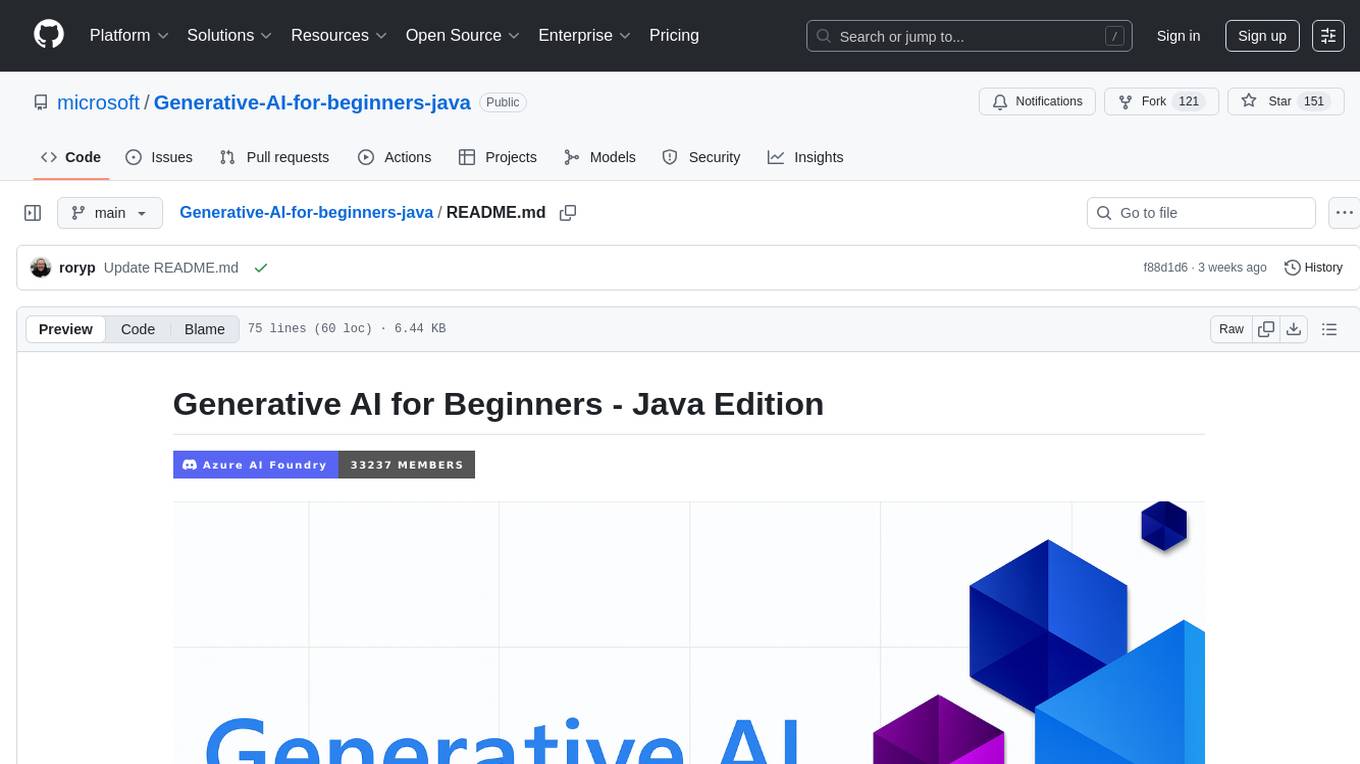
Generative-AI-for-beginners-java
Generative AI for Beginners - Java Edition is a comprehensive workshop that introduces users to the core concepts of generative AI, Java AI ecosystem, model context protocol, and practical applications. The course covers topics such as prompt engineering, embeddings & vector operations, retrieval-augmented generation, and responsible AI development. Users can explore real-world scenarios like chatbots, content generation, and ethical AI development. The workshop provides a hands-on learning experience with multi-language support and development environment setup guidance.
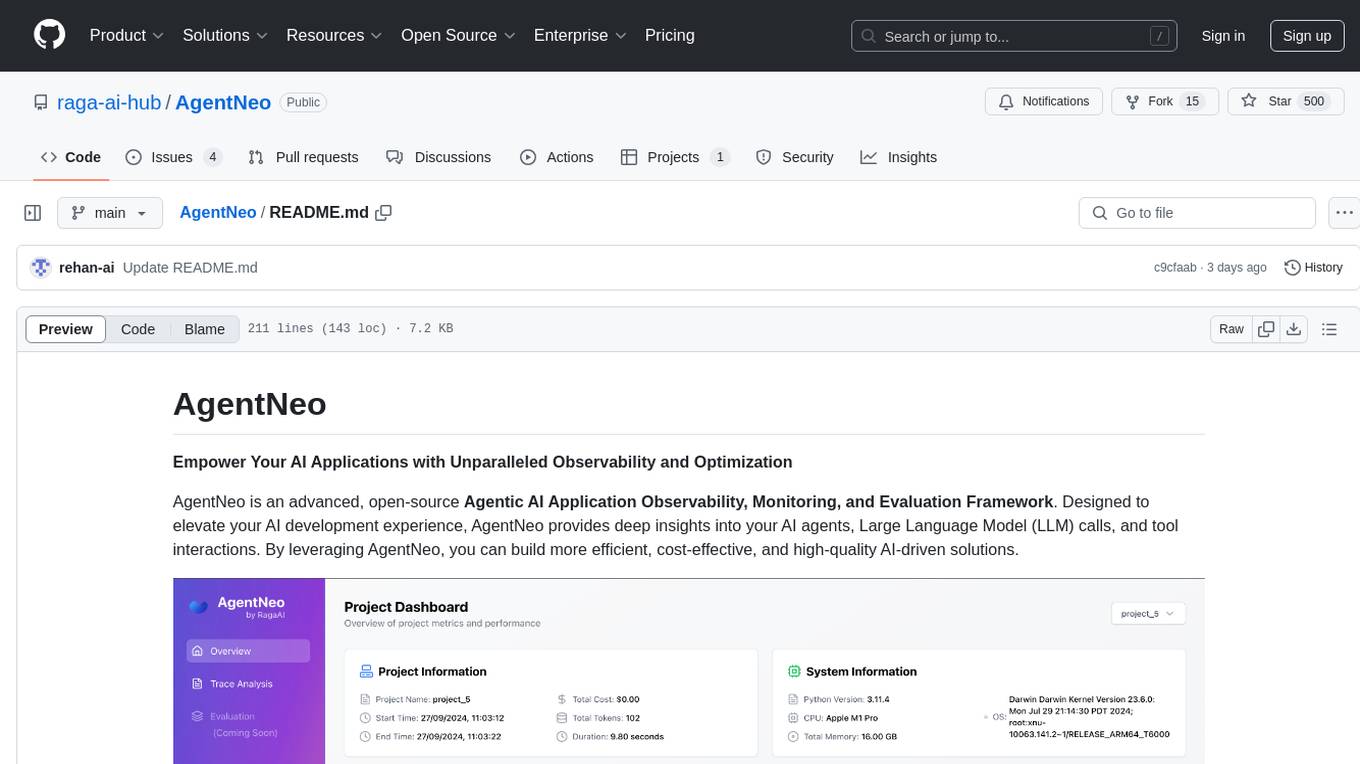
AgentNeo
AgentNeo is an advanced, open-source Agentic AI Application Observability, Monitoring, and Evaluation Framework designed to provide deep insights into AI agents, Large Language Model (LLM) calls, and tool interactions. It offers robust logging, visualization, and evaluation capabilities to help debug and optimize AI applications with ease. With features like tracing LLM calls, monitoring agents and tools, tracking interactions, detailed metrics collection, flexible data storage, simple instrumentation, interactive dashboard, project management, execution graph visualization, and evaluation tools, AgentNeo empowers users to build efficient, cost-effective, and high-quality AI-driven solutions.
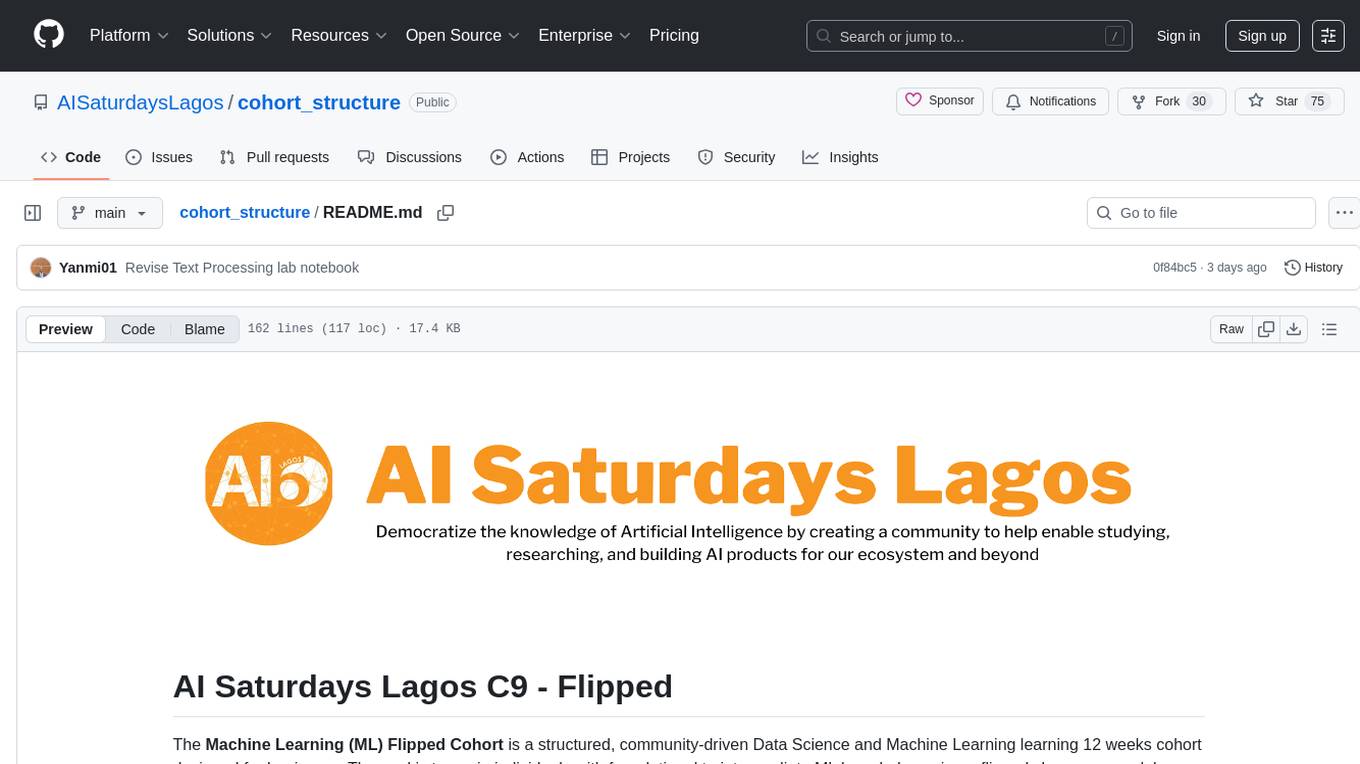
cohort_structure
The Machine Learning (ML) Flipped Cohort is a 12-week structured program designed for beginners to gain foundational to intermediate ML knowledge. Participants consume pre-recorded content during the week and engage in weekly community discussions. The program covers topics such as Python, data science foundations, databases, math for ML, text processing, linear regression, non-linear modeling, deep learning basics, and more. Participants work on capstone projects and are assessed through Google Forms. Certification requires minimum attendance, assessment scores, and participation in the final project. The cohort provides a supportive learning environment with mentorship and community interaction.

motia
Motia is an AI agent framework designed for software engineers to create, test, and deploy production-ready AI agents quickly. It provides a code-first approach, allowing developers to write agent logic in familiar languages and visualize execution in real-time. With Motia, developers can focus on business logic rather than infrastructure, offering zero infrastructure headaches, multi-language support, composable steps, built-in observability, instant APIs, and full control over AI logic. Ideal for building sophisticated agents and intelligent automations, Motia's event-driven architecture and modular steps enable the creation of GenAI-powered workflows, decision-making systems, and data processing pipelines.
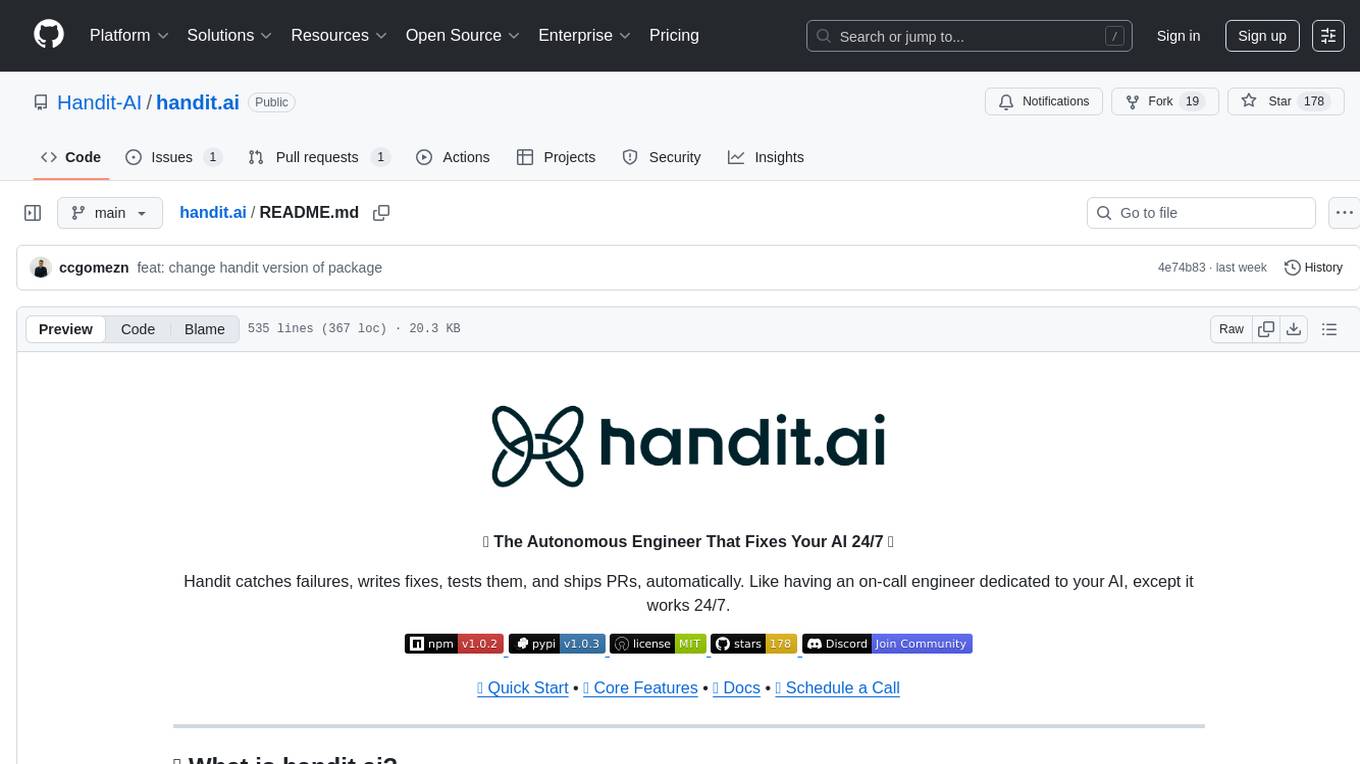
handit.ai
Handit.ai is an autonomous engineer tool designed to fix AI failures 24/7. It catches failures, writes fixes, tests them, and ships PRs automatically. It monitors AI applications, detects issues, generates fixes, tests them against real data, and ships them as pull requests—all automatically. Users can write JavaScript, TypeScript, Python, and more, and the tool automates what used to require manual debugging and firefighting.
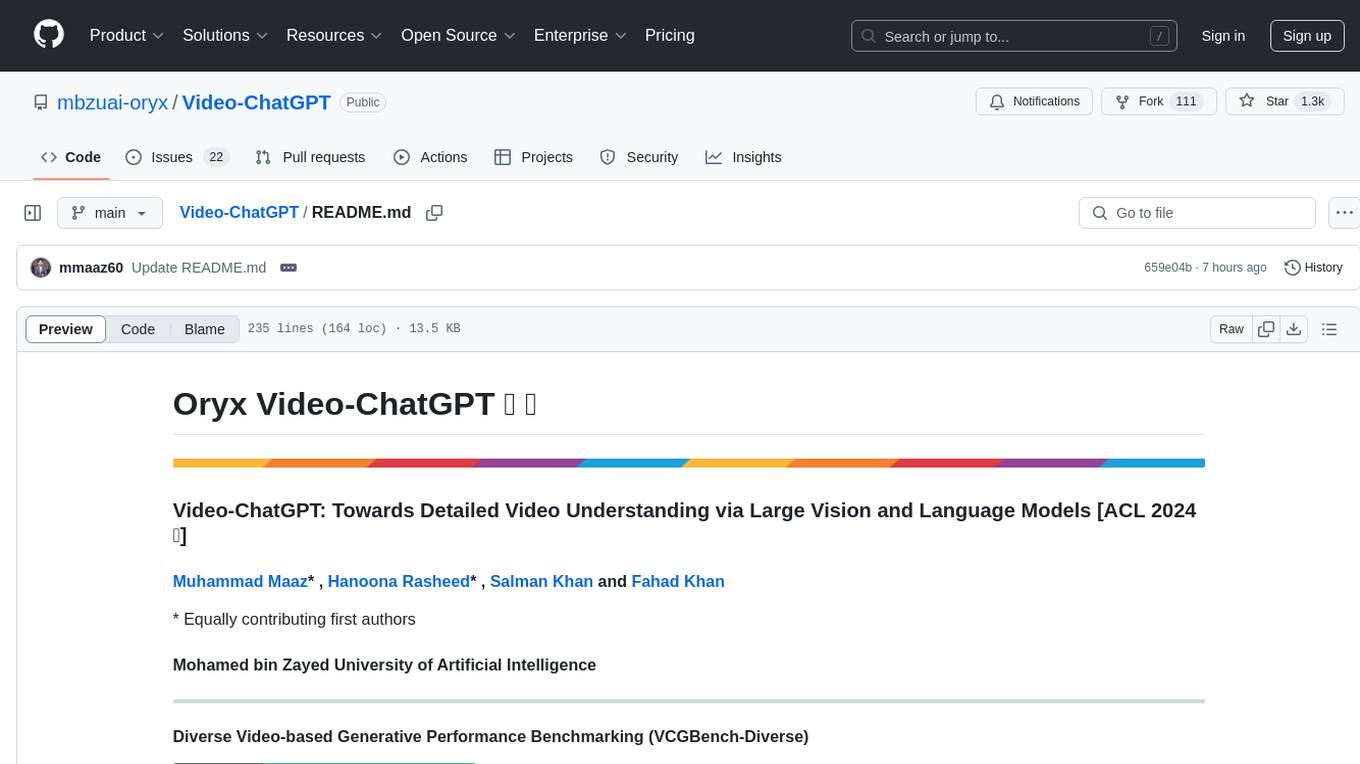
Video-ChatGPT
Video-ChatGPT is a video conversation model that aims to generate meaningful conversations about videos by combining large language models with a pretrained visual encoder adapted for spatiotemporal video representation. It introduces high-quality video-instruction pairs, a quantitative evaluation framework for video conversation models, and a unique multimodal capability for video understanding and language generation. The tool is designed to excel in tasks related to video reasoning, creativity, spatial and temporal understanding, and action recognition.
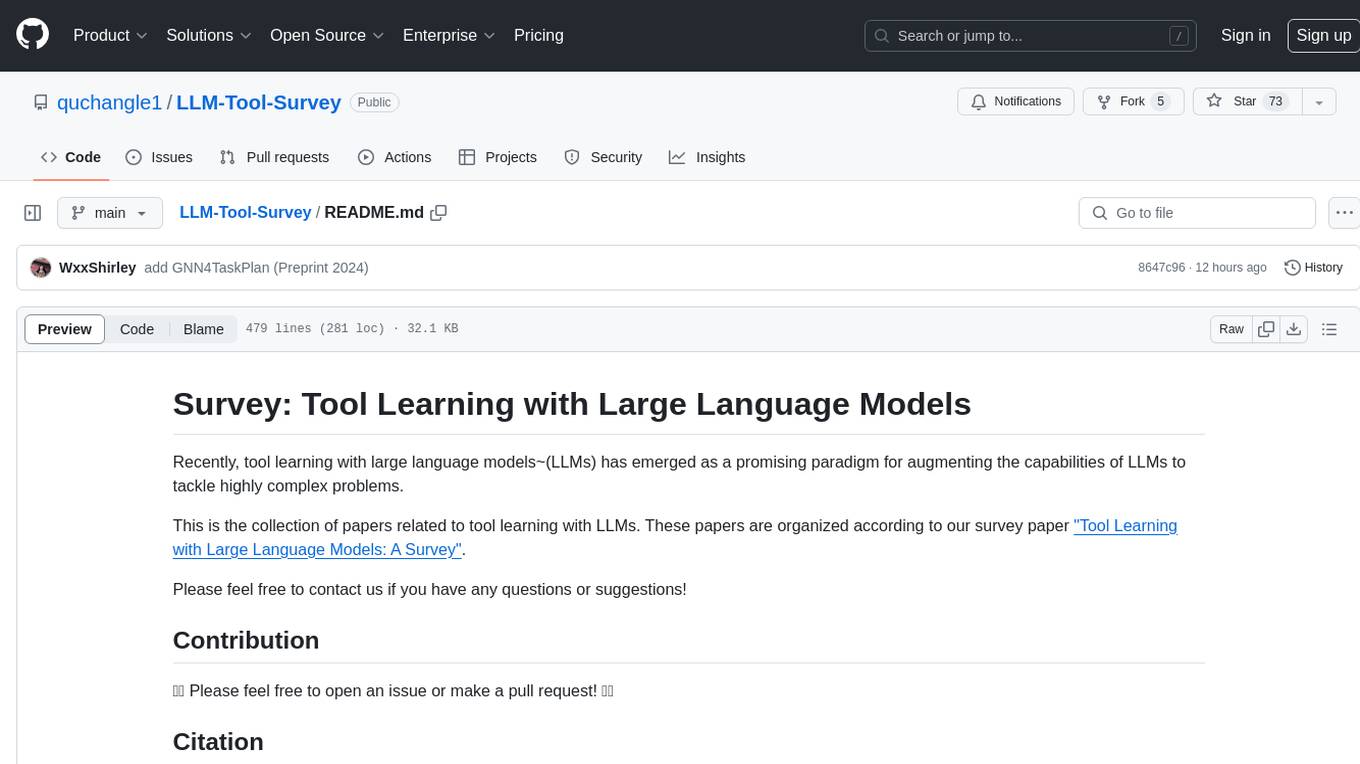
LLM-Tool-Survey
This repository contains a collection of papers related to tool learning with large language models (LLMs). The papers are organized according to the survey paper 'Tool Learning with Large Language Models: A Survey'. The survey focuses on the benefits and implementation of tool learning with LLMs, covering aspects such as task planning, tool selection, tool calling, response generation, benchmarks, evaluation, challenges, and future directions in the field. It aims to provide a comprehensive understanding of tool learning with LLMs and inspire further exploration in this emerging area.
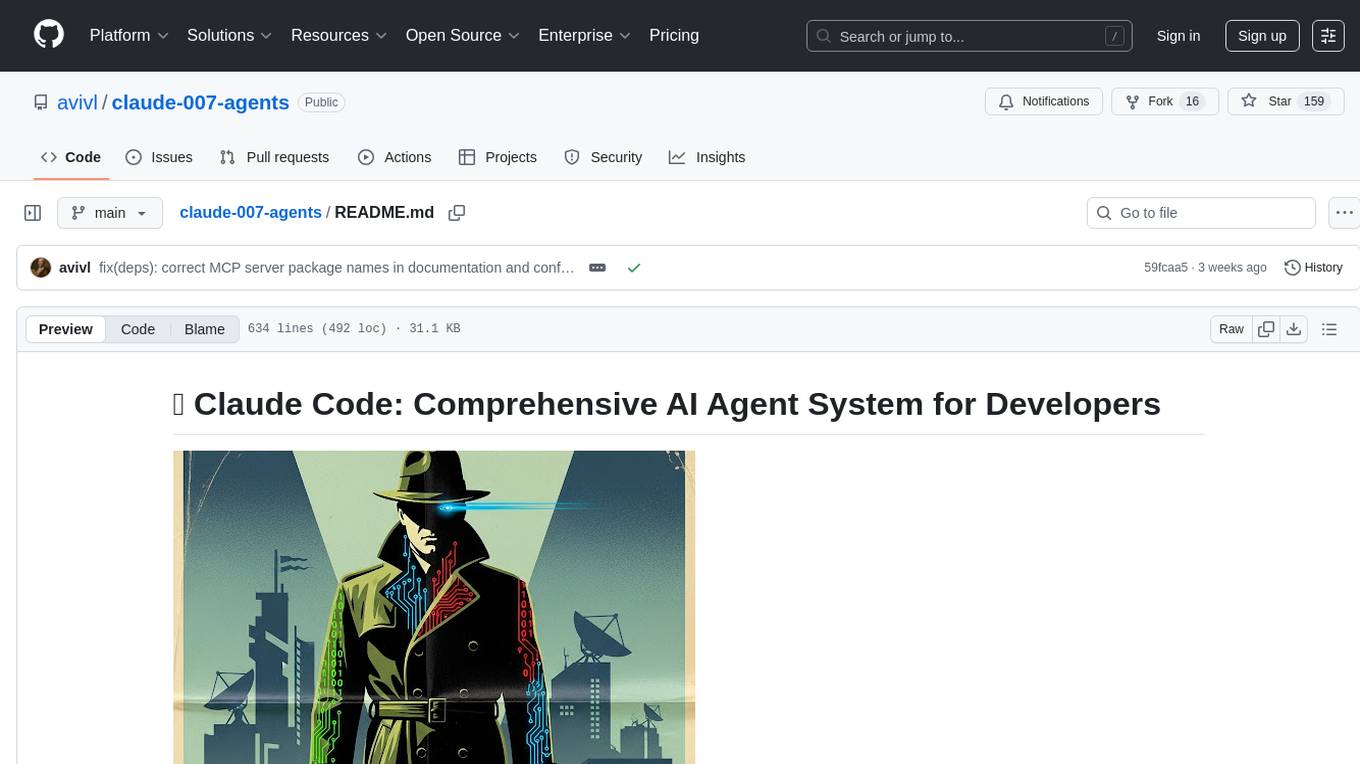
claude-007-agents
Claude Code Agents is an open-source AI agent system designed to enhance development workflows by providing specialized AI agents for orchestration, resilience engineering, and organizational memory. These agents offer specialized expertise across technologies, AI system with organizational memory, and an agent orchestration system. The system includes features such as engineering excellence by design, advanced orchestration system, Task Master integration, live MCP integrations, professional-grade workflows, and organizational intelligence. It is suitable for solo developers, small teams, enterprise teams, and open-source projects. The system requires a one-time bootstrap setup for each project to analyze the tech stack, select optimal agents, create configuration files, set up Task Master integration, and validate system readiness.
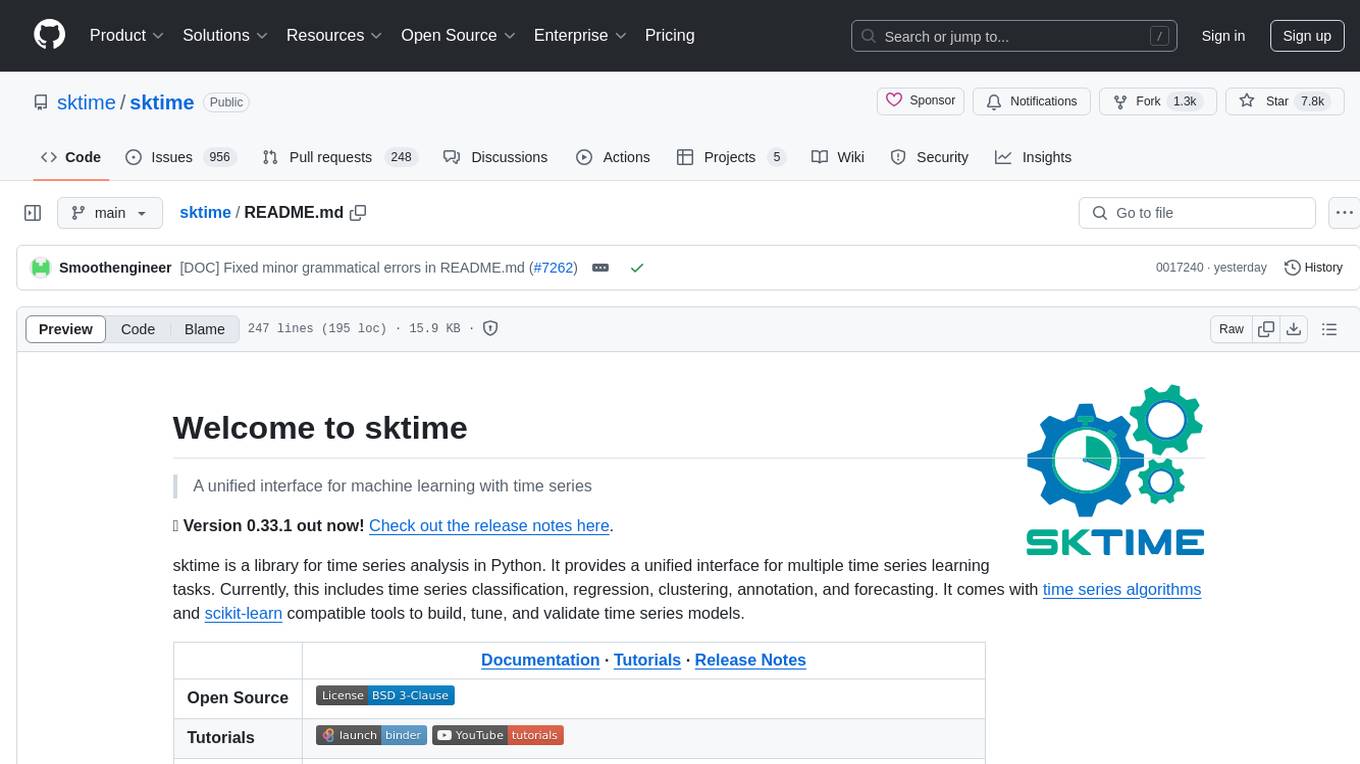
sktime
sktime is a Python library for time series analysis that provides a unified interface for various time series learning tasks such as classification, regression, clustering, annotation, and forecasting. It offers time series algorithms and tools compatible with scikit-learn for building, tuning, and validating time series models. sktime aims to enhance the interoperability and usability of the time series analysis ecosystem by empowering users to apply algorithms across different tasks and providing interfaces to related libraries like scikit-learn, statsmodels, tsfresh, PyOD, and fbprophet.
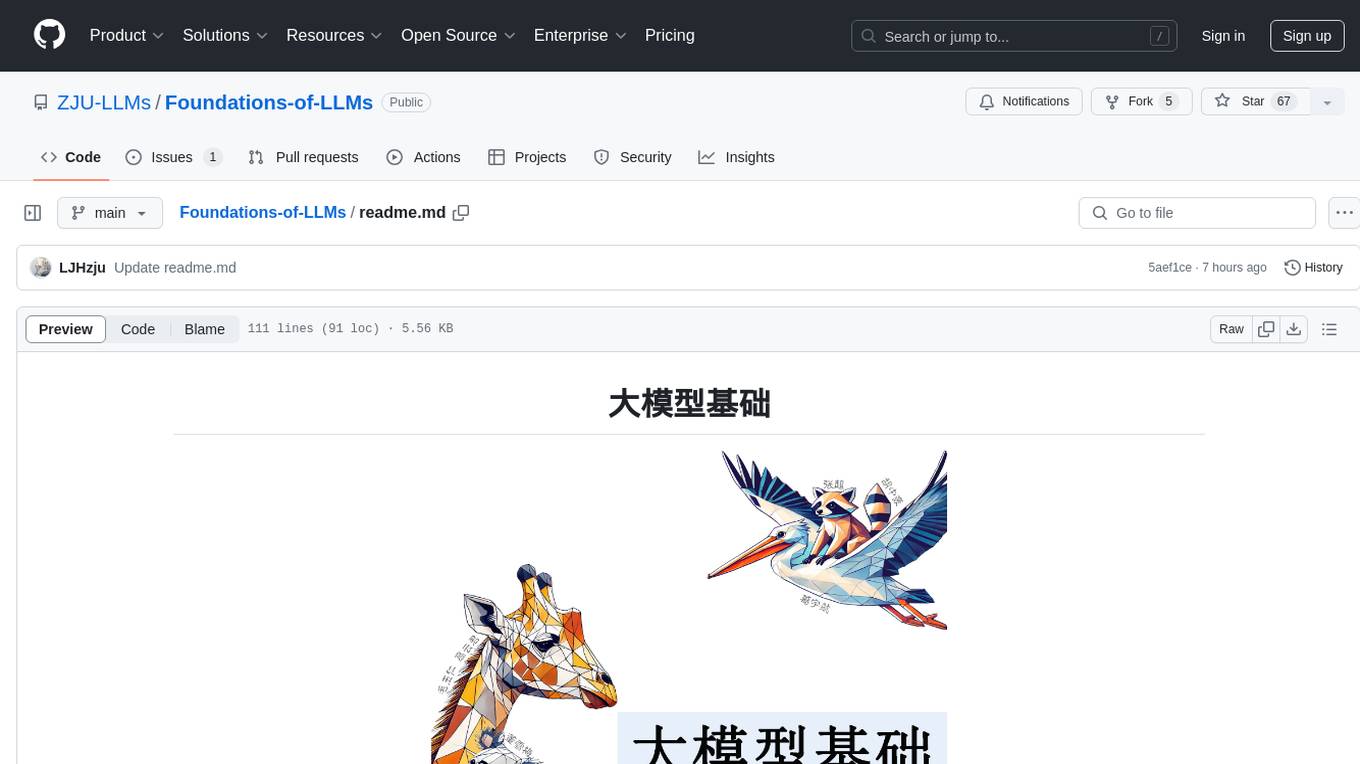
Foundations-of-LLMs
Foundations-of-LLMs is a comprehensive book aimed at readers interested in large language models, providing systematic explanations of foundational knowledge and introducing cutting-edge technologies. The book covers traditional language models, evolution of large language model architectures, prompt engineering, parameter-efficient fine-tuning, model editing, and retrieval-enhanced generation. Each chapter uses an animal as a theme to explain specific technologies, enhancing readability. The content is based on the author team's exploration and understanding of the field, with continuous monthly updates planned. The book includes a 'Paper List' for each chapter to track the latest advancements in related technologies.
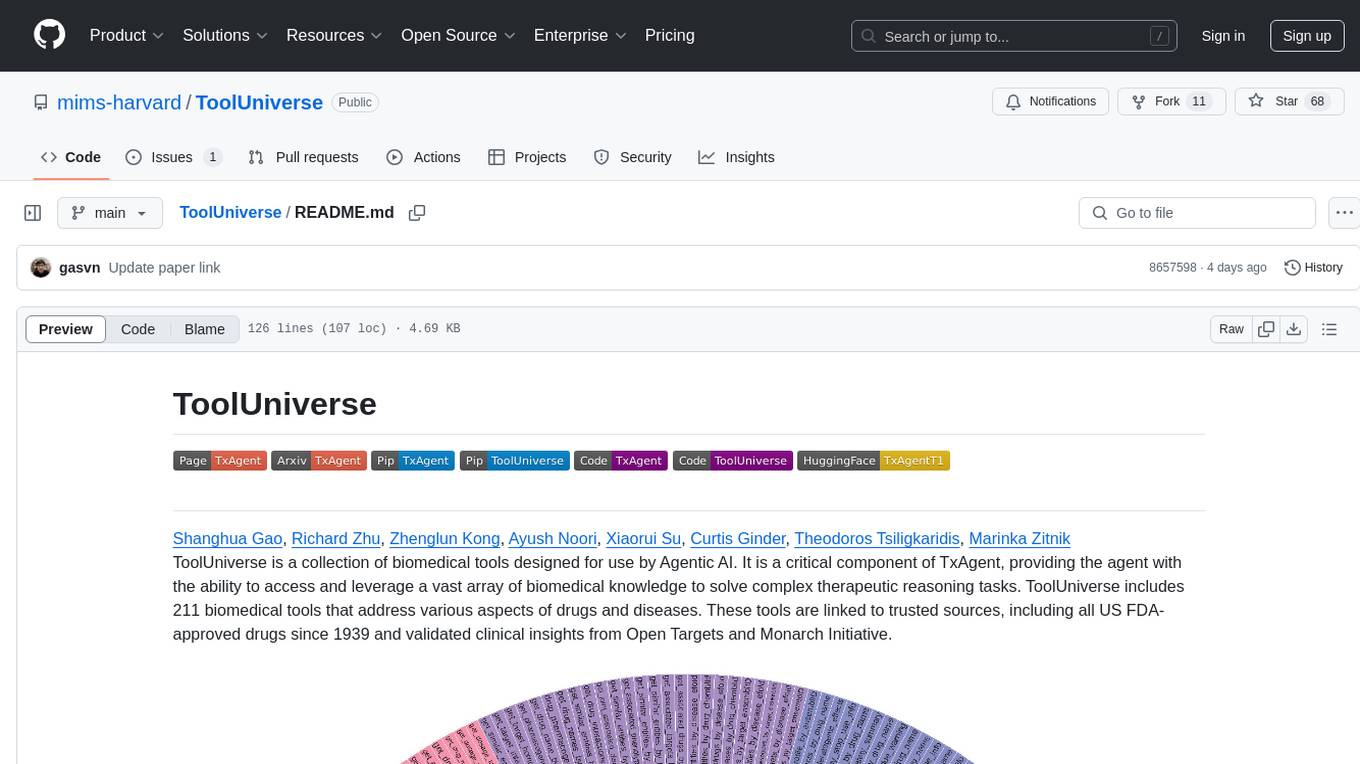
ToolUniverse
ToolUniverse is a collection of 211 biomedical tools designed for Agentic AI, providing access to biomedical knowledge for solving therapeutic reasoning tasks. The tools cover various aspects of drugs and diseases, linked to trusted sources like US FDA-approved drugs since 1939, Open Targets, and Monarch Initiative.
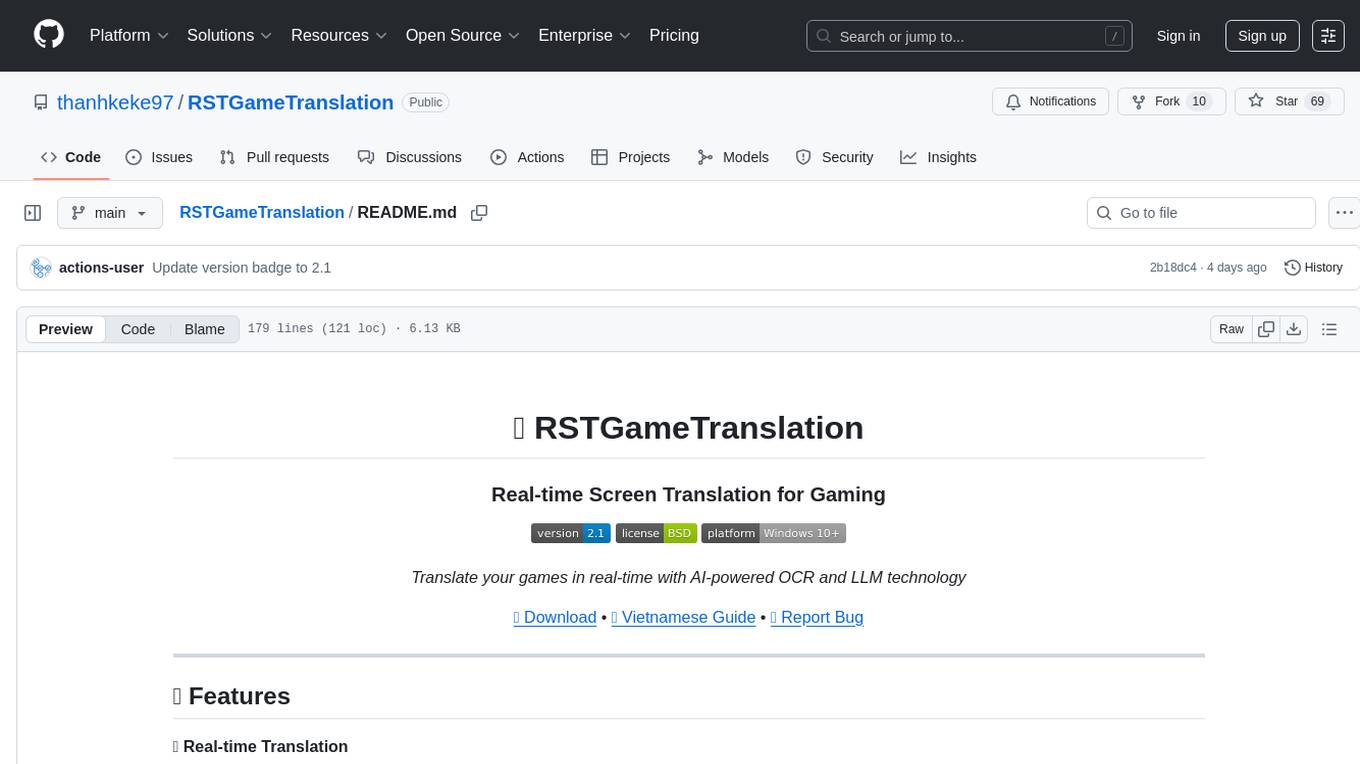
RSTGameTranslation
RSTGameTranslation is a tool designed for translating game text into multiple languages efficiently. It provides a user-friendly interface for game developers to easily manage and localize their game content. With RSTGameTranslation, developers can streamline the translation process, ensuring consistency and accuracy across different language versions of their games. The tool supports various file formats commonly used in game development, making it versatile and adaptable to different project requirements. Whether you are working on a small indie game or a large-scale production, RSTGameTranslation can help you reach a global audience by making localization a seamless and hassle-free experience.
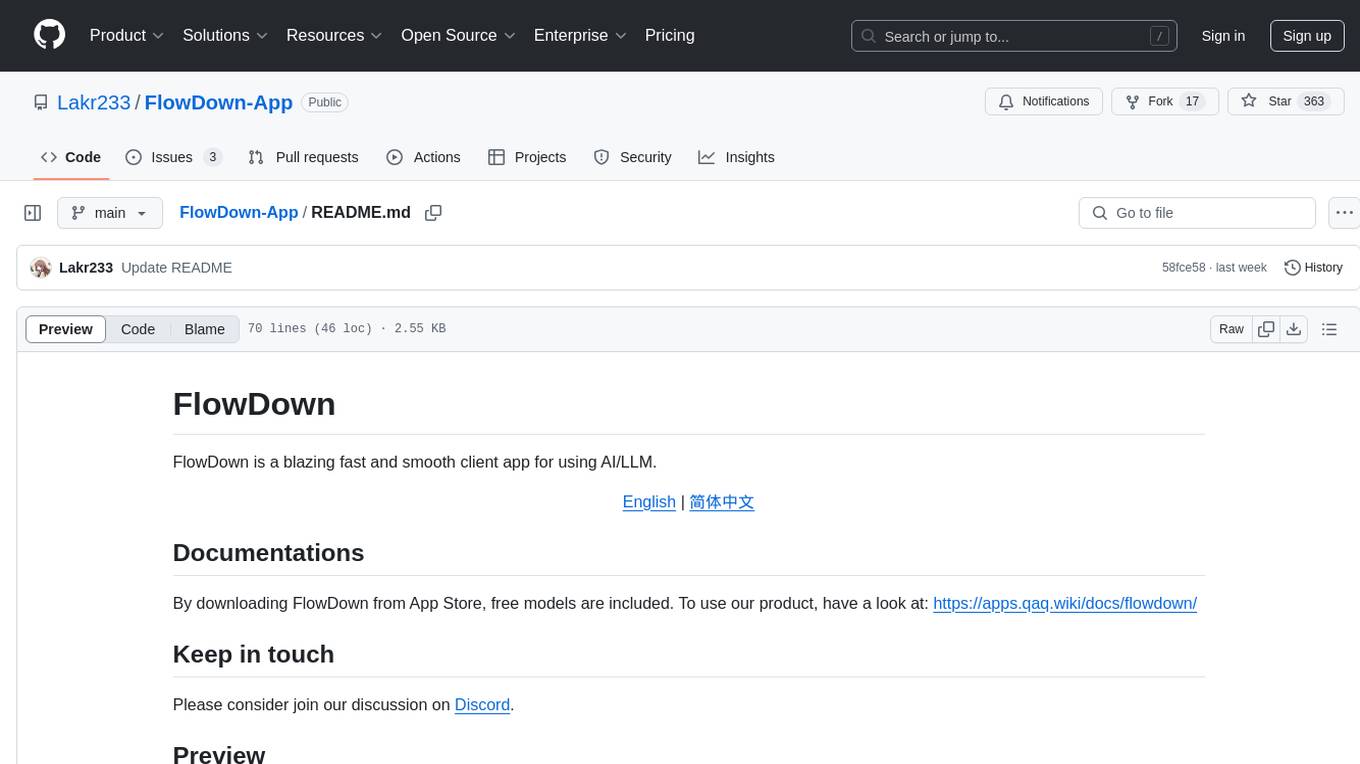
FlowDown-App
FlowDown is a blazing fast and smooth client app for using AI/LLM. It is lightweight and efficient with markdown support, universal compatibility, blazing fast text rendering, automated chat titles, and privacy by design. There are two editions available: FlowDown and FlowDown Community, with various features like chat with AI, fast markdown, privacy by design, bring your own LLM, offline LLM w/ MLX, visual LLM, web search, attachments, and language localization. FlowDown Community is now open-source, empowering developers to build interactive and responsive AI client apps.
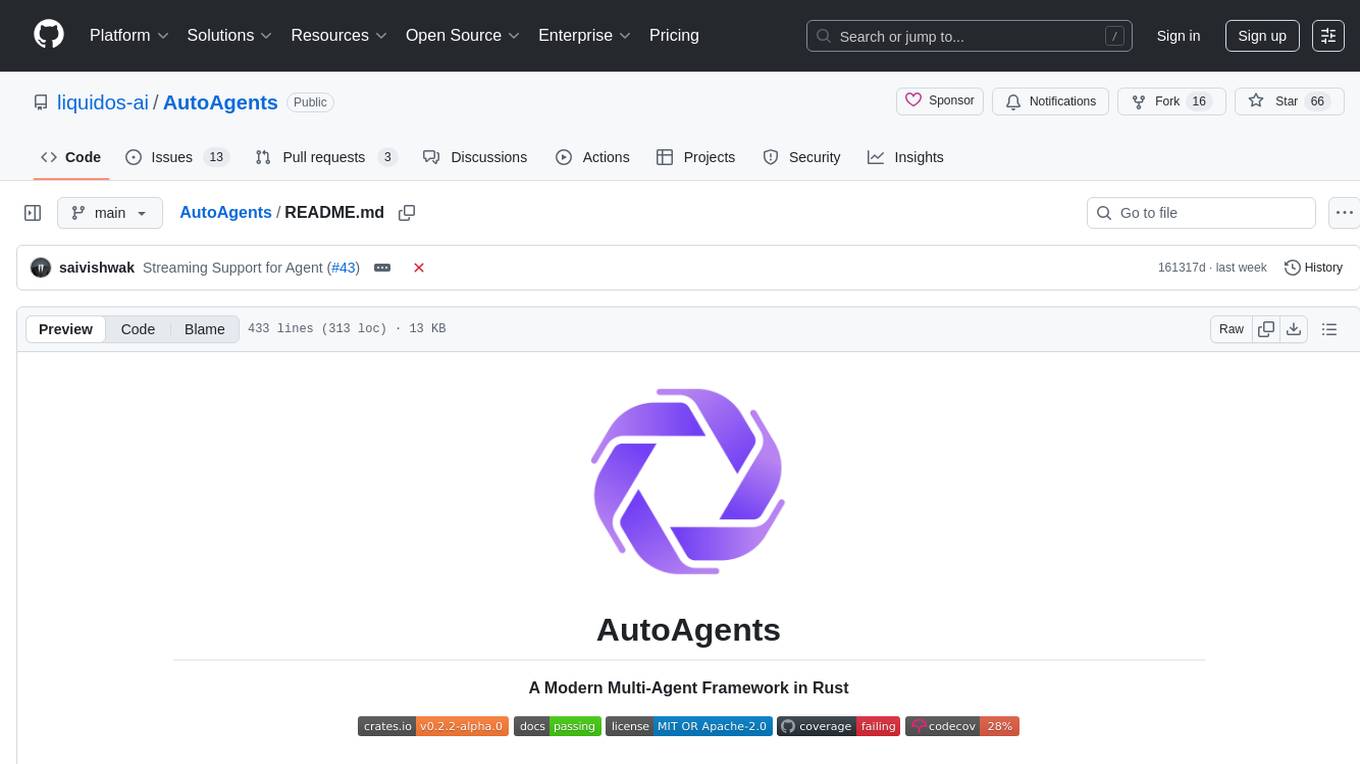
AutoAgents
AutoAgents is a cutting-edge multi-agent framework built in Rust that enables the creation of intelligent, autonomous agents powered by Large Language Models (LLMs) and Ractor. Designed for performance, safety, and scalability. AutoAgents provides a robust foundation for building complex AI systems that can reason, act, and collaborate. With AutoAgents you can create Cloud Native Agents, Edge Native Agents and Hybrid Models as well. It is so extensible that other ML Models can be used to create complex pipelines using Actor Framework.
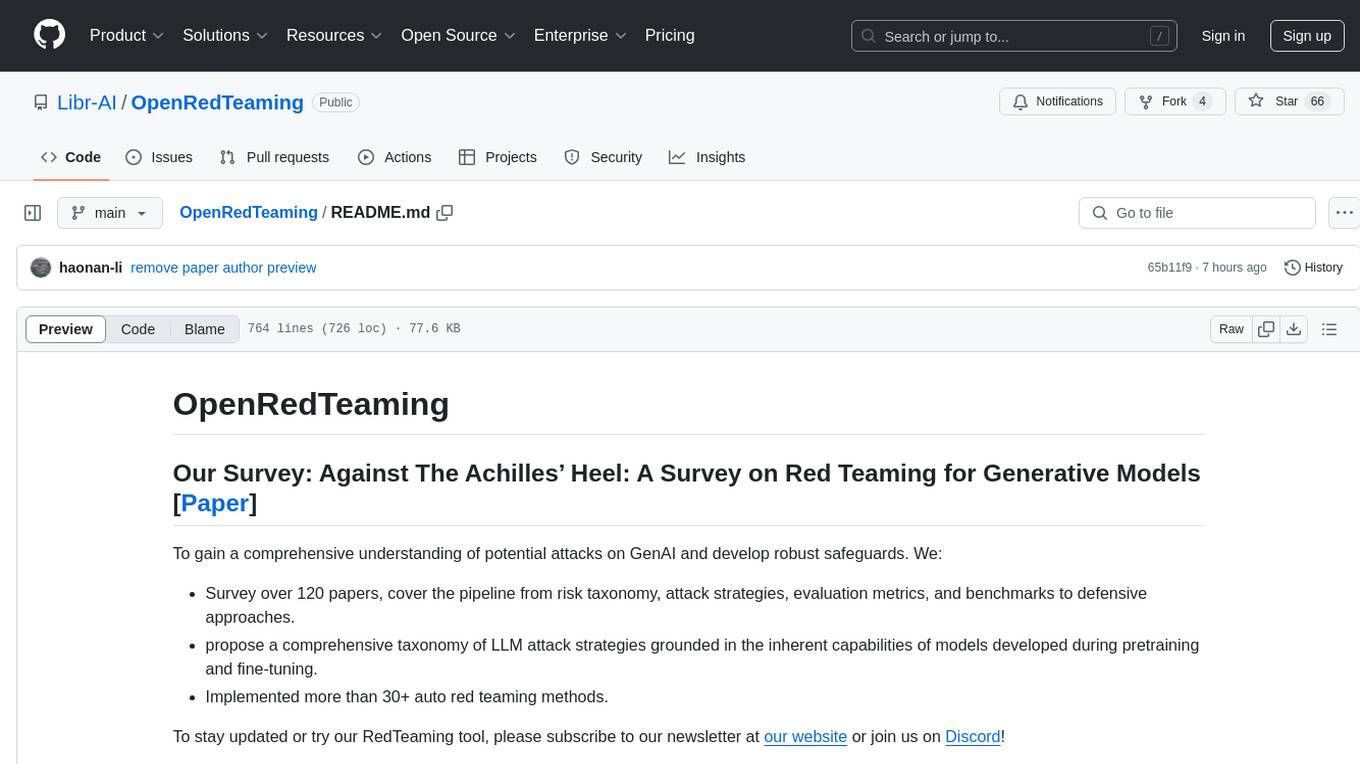
OpenRedTeaming
OpenRedTeaming is a repository focused on red teaming for generative models, specifically large language models (LLMs). The repository provides a comprehensive survey on potential attacks on GenAI and robust safeguards. It covers attack strategies, evaluation metrics, benchmarks, and defensive approaches. The repository also implements over 30 auto red teaming methods. It includes surveys, taxonomies, attack strategies, and risks related to LLMs. The goal is to understand vulnerabilities and develop defenses against adversarial attacks on large language models.
For similar tasks

LLM-on-Tabular-Data-Prediction-Table-Understanding-Data-Generation
This repository serves as a comprehensive survey on the application of Large Language Models (LLMs) on tabular data, focusing on tasks such as prediction, data generation, and table understanding. It aims to consolidate recent progress in this field by summarizing key techniques, metrics, datasets, models, and optimization approaches. The survey identifies strengths, limitations, unexplored territories, and gaps in the existing literature, providing insights for future research directions. It also offers code and dataset references to empower readers with the necessary tools and knowledge to address challenges in this rapidly evolving domain.
For similar jobs

sweep
Sweep is an AI junior developer that turns bugs and feature requests into code changes. It automatically handles developer experience improvements like adding type hints and improving test coverage.

teams-ai
The Teams AI Library is a software development kit (SDK) that helps developers create bots that can interact with Teams and Microsoft 365 applications. It is built on top of the Bot Framework SDK and simplifies the process of developing bots that interact with Teams' artificial intelligence capabilities. The SDK is available for JavaScript/TypeScript, .NET, and Python.

ai-guide
This guide is dedicated to Large Language Models (LLMs) that you can run on your home computer. It assumes your PC is a lower-end, non-gaming setup.

classifai
Supercharge WordPress Content Workflows and Engagement with Artificial Intelligence. Tap into leading cloud-based services like OpenAI, Microsoft Azure AI, Google Gemini and IBM Watson to augment your WordPress-powered websites. Publish content faster while improving SEO performance and increasing audience engagement. ClassifAI integrates Artificial Intelligence and Machine Learning technologies to lighten your workload and eliminate tedious tasks, giving you more time to create original content that matters.

chatbot-ui
Chatbot UI is an open-source AI chat app that allows users to create and deploy their own AI chatbots. It is easy to use and can be customized to fit any need. Chatbot UI is perfect for businesses, developers, and anyone who wants to create a chatbot.

BricksLLM
BricksLLM is a cloud native AI gateway written in Go. Currently, it provides native support for OpenAI, Anthropic, Azure OpenAI and vLLM. BricksLLM aims to provide enterprise level infrastructure that can power any LLM production use cases. Here are some use cases for BricksLLM: * Set LLM usage limits for users on different pricing tiers * Track LLM usage on a per user and per organization basis * Block or redact requests containing PIIs * Improve LLM reliability with failovers, retries and caching * Distribute API keys with rate limits and cost limits for internal development/production use cases * Distribute API keys with rate limits and cost limits for students

uAgents
uAgents is a Python library developed by Fetch.ai that allows for the creation of autonomous AI agents. These agents can perform various tasks on a schedule or take action on various events. uAgents are easy to create and manage, and they are connected to a fast-growing network of other uAgents. They are also secure, with cryptographically secured messages and wallets.

griptape
Griptape is a modular Python framework for building AI-powered applications that securely connect to your enterprise data and APIs. It offers developers the ability to maintain control and flexibility at every step. Griptape's core components include Structures (Agents, Pipelines, and Workflows), Tasks, Tools, Memory (Conversation Memory, Task Memory, and Meta Memory), Drivers (Prompt and Embedding Drivers, Vector Store Drivers, Image Generation Drivers, Image Query Drivers, SQL Drivers, Web Scraper Drivers, and Conversation Memory Drivers), Engines (Query Engines, Extraction Engines, Summary Engines, Image Generation Engines, and Image Query Engines), and additional components (Rulesets, Loaders, Artifacts, Chunkers, and Tokenizers). Griptape enables developers to create AI-powered applications with ease and efficiency.